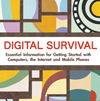- The Computer
- The Internet
- The Mobile Phone
Computer viruses
 If you use a computer, the sad fact is that you need to know about computer viruses. There are many different ways to classify viruses, each with its own set of colourfully named categories. Worms, macroviruses, trojans and backdoors are some of the more well-known examples. Many of these viruses spread over the internet using email, malicious webpages or other means to infect unprotected computers. Others spread through removable media, particularly devices like USB memory sticks and external hard drives that allow users to write information as well as reading it. Viruses can destroy, damage or infect the information on your computer, including data on external drives. They can also take control of your computer and use it to attack other computers.
If you use a computer, the sad fact is that you need to know about computer viruses. There are many different ways to classify viruses, each with its own set of colourfully named categories. Worms, macroviruses, trojans and backdoors are some of the more well-known examples. Many of these viruses spread over the internet using email, malicious webpages or other means to infect unprotected computers. Others spread through removable media, particularly devices like USB memory sticks and external hard drives that allow users to write information as well as reading it. Viruses can destroy, damage or infect the information on your computer, including data on external drives. They can also take control of your computer and use it to attack other computers.
To protect yourself from these threats, you need to install an anti-virus application, and run it regularly. There are both proprietary and FOSS versions of these. If you buy a computer, it will probably not have anti-virus programmes pre-installed, so you need to decide which to use. Whichever you choose, ensure that it scans your computer for viruses as well as spyware. Some programmes combine the two functions, while others are separate. A good combination is the two open source applications: Avast anti-virus and Spybot anti-spyware.
You can find out more about these and download them free of charge in the Hands-on Guides in the Security in-a-box toolkit.
Avast: http://security.tacticaltech.org/avast_main
Spybot: http://security.tacticaltech.org/spybot_main
Internet café security note: If you're working in internet cafés you are not going to know if the computer you're working on is infected or not. That's why Avast virus cleaner has a portable application which you can run straight from your USB flash disk. You can download it from the Avast website here: http://www.avast.com/eng/avast-virus-cleaner.html

